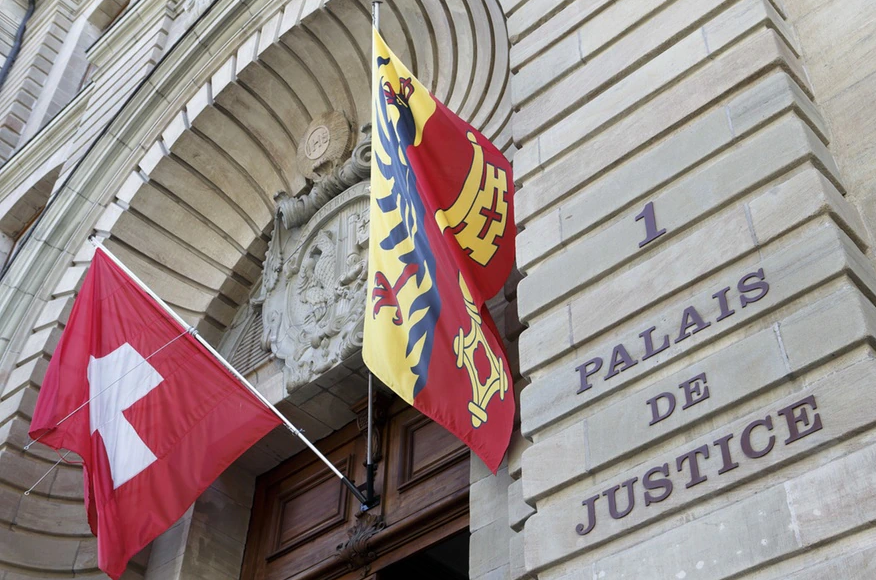The bill comes to CHF410 million. The amount demanded by the Geneva revenue administration from French billionaire Pierre Castel has drawn the attention of the international press and made waves locally.
The Administrative Court of Geneva announced last year that Pierre Castel, a wine merchant and the 12th-richest man in Switzerland, was required to pay back tax to the tune of CHF410 million ($443 million) – enough to wipe out the canton’s current deficit.
That caused quite a stir, not just because of the amount involved, but also because it raised questions about the innerworkings of the Geneva revenue administration. For the past 30 years, it seems, Castel failed to tell tax authorities that he headed the Castel Group and that he earned considerable dividends via a foundation located in Liechtenstein and another fund located in Singapore. It took the authorities quite some time to notice.
Castel, who is now 96 years old, reportedly registered with the revenue administration under his second personal name, Jésus, which enabled him to avoid the attention of inspectors and evade “large sums” of tax, according to the city court in Geneva which first heard the case. His true identity was only discovered thanks to the press.
215 companies in 40 countries
In trying to understand the tax case against the billionaire in Geneva, a look at how the Castel group is structured can be illuminating. In a 2021 study conducted on behalf of the French NGO Survie, which targets economic corruption in Africa, researcher Olivier Blamangin found that the corporate group had built up “an intricate structure of firms and holding companies based in tax havens which enabled it to channel its profits to the most attractive offshore locations at any given moment”.
Castel built the Castel Group (at one time known as Castel Frères) together with his brothers and sisters. It comprises 215 different companies in 40 countries. The French billionaire has resided in Switzerland since 1981. He lived in canton Geneva from 1990 to 2012, then he and his wife moved to canton Valais. The Castel family rank 12th among Switzerland’s wealthiest, according to the business magazine Bilan, with a total fortune estimated at CHF13-14 billion.
Castel has claimed that he wanted to withdraw from leading the group “so that it would continue to exist independently and not be dependent on him or his heirs”. He maintains that in 1992 he divested himself of the entire share capital of the group. At first he transferred ownership to a foundation based in Liechtenstein called SCOMAF. Then, beginning in 2009, this foundation in Vaduz transferred ownership of Cassiopée Limited, the top-level holding company for all the share capital of the Castel group, to a fund in Singapore, the Investment Beverage Business Fund (IBBF). Castel denies being a tax dodger and claims to have “been guilty of no fault – if he was guilty of anything, it was just a slight lack of prudence”.
This version of the facts did not convince the Swiss revenue administration, which suspected the elderly tycoon of having kept control of the group and never really relinquishing ownership of the assets he claimed to have transferred, first to the foundation in Liechtenstein, then to the fund in Singapore. Castel had not declared the dividends he received from these two sources during the period under dispute.
Federal Court denies appeal
Was this just an isolated case? Were there other losses for Geneva taxpayers? Was the fine large enough? It was only at the end of 2017 that the Geneva revenue administration started proceedings against the billionaire with regard to the tax years 2007 to 2011. Previous years were not taken into account because of a statute of limitations.
For the moment, Castel has only agreed to pay the amount due for 2009. He has appealed the decision on the other years to the Federal Court and the Administrative Court of Geneva. The latter has been examining the years 2010 and 2011, and its judgement is still pending.
The Federal Court in December found that the tax penalties demanded by the Geneva revenue administration for the years 2007 and 2008 – amounting to €290 million – were justified. The judges found it difficult “to imagine any other motive [than tax evasion] that would lead a taxpayer to submit to the revenue administration information which he knew to be wrong or incomplete”.
In Switzerland, tax evasion, where the taxpayer fails to declare income and or assets, is a fineable offence. In what seems to be an indirect censure of the local revenue administration, the Geneva judges found that the “size of the fine, set at three-quarters of the amount of tax withheld, seems weak or at least unduly clement”.
Contacted by SWI swissinfo.ch, the Geneva federation of government employees’ unions stated that “there is wealth in Geneva needing to be taxed”, and it criticised the workings of a system “which makes far too many tax concessions to the wealthiest people”.
In defence of the government, Geneva Finance Minister Nathalie Fontanet says that in the past ten years, the cantonal tax administration has recovered “some CHF2.5 billion due to the careful investigative work of its staff”. She also insists “that there can be no connection made between a case before the courts and the coming year’s budget”.
Amount of fine redacted
In the halls of justice themselves, the media spotlight on this case has had some odd effects.
The Swiss news site Gotham City, which reports on court decisions in white-collar crime cases making use of publicly-available sources, was the first to discover the huge fine levied on the billionaire in a judgement published on the website of the Administrative Court.
As is usual in the publication of court decisions, the judgement published on the website indicated the amounts involved. Yet a day after a news article on it appeared, the court abruptly removed the judgement from its site. Two days later it was back, but with the sum levied on Castel deleted.
Asked about this several times, the court press office had no explanation to offer for this belated and highly unusual redaction of a judgement. In the absence of an explanation, it is certainly hard to understand this special treatment being accorded to a billionaire.
Castel’s own lawyer, Gregory Clerc, insists that “no request was made by my client (directly or indirectly) to the courts with regard to any information being kept secret.”
Another investigation in progress
The Castel empire derives most of its income from Africa. The group has been active there since the early 1950s. It has something approaching a monopoly of the manufacture of beers and soft drinks in several African countries.
A 2021 report from the NGO The Sentry found that, to protect its market share of the sugar industry, one of the African subsidiaries of the Castel Group funded armed militias responsible for major atrocities in the Central African Republic. In response, in July 2022 the national anti-terrorist prosecutor’s office in France began an investigation of the group for crimes against humanity.
Translated from French by Terence MacNamee
More: SWI swissinfo.ch certified by the Journalism Trust Initiative
Full story here Are you the author? Previous post See more for Next postTags: Featured,newsletter,Politics

























